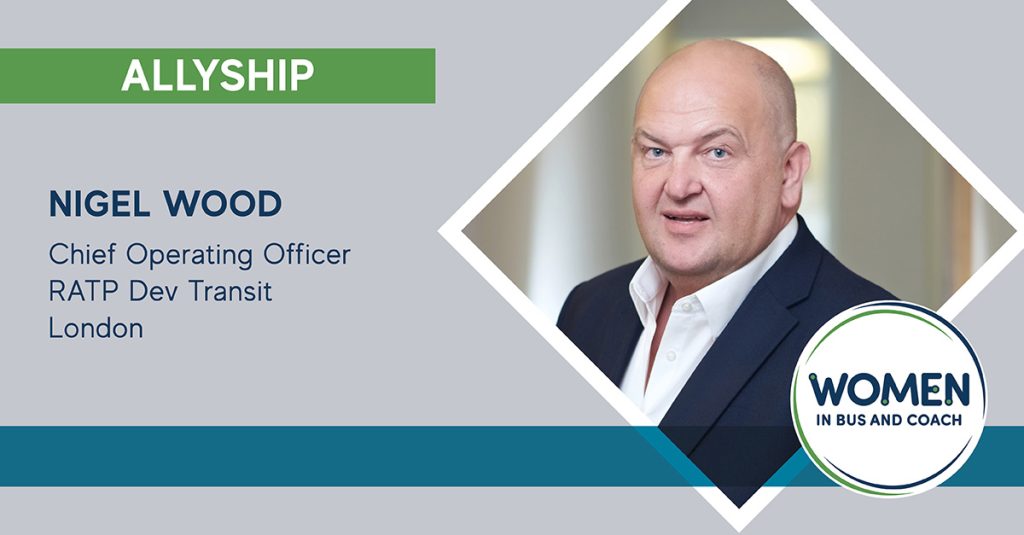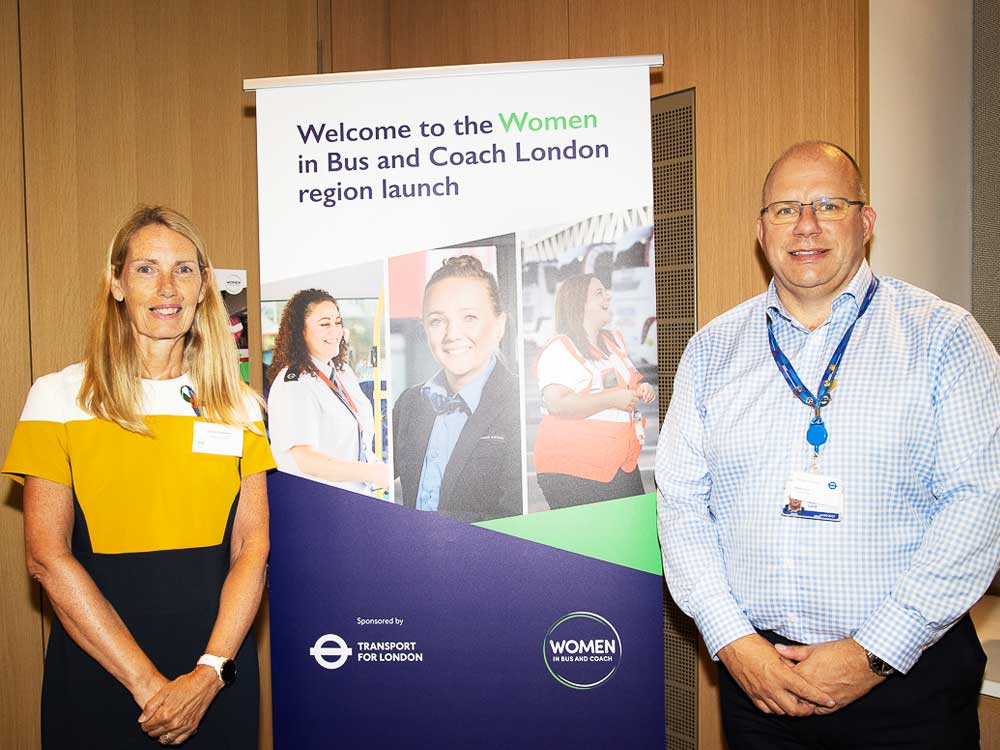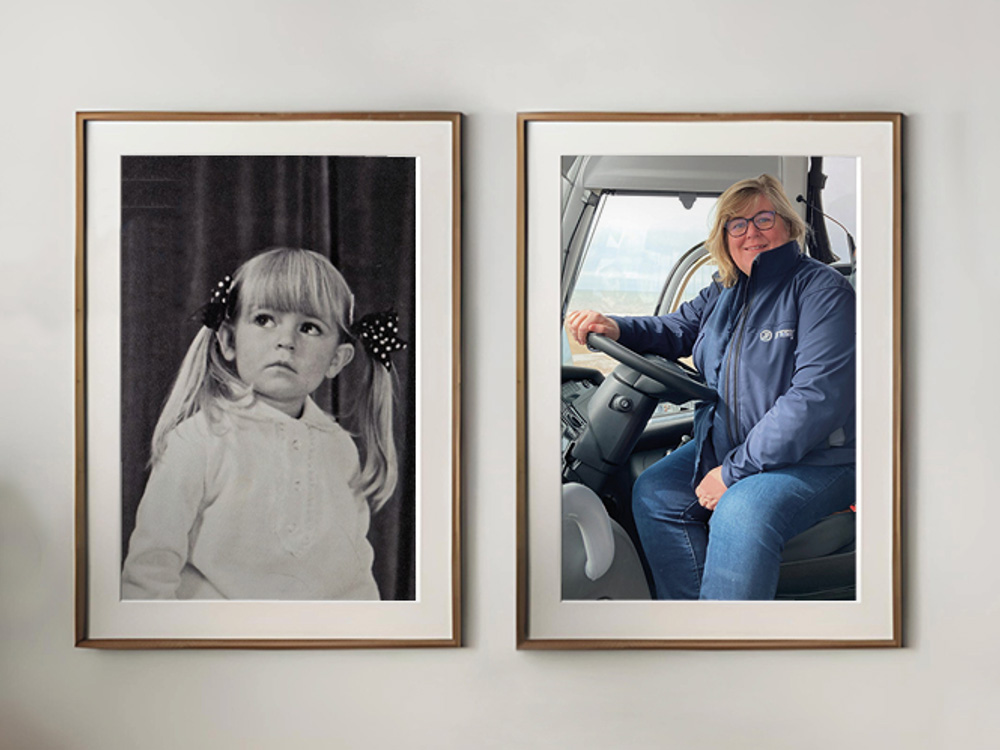Our Allyship initiative recognises individuals who have been allies in supporting and encouraging Women across the bus, coach, and community transport sector. Individuals who have contributed significantly to the professional growth and empowerment of women, whether through mentorship, advocacy, or creating opportunities for women to thrive, these allies have played a crucial role in promoting gender equality and diversity in our sector.
This initiative aims to encourage everyone to be allies, with the individuals featured sharing insights into their own professional career background, their ally approach, as well as providing suggestions and advice on how we all can be allies.
Today we hear from and learn about:
Nigel Wood
Chief Operating Officer
RATP Dev Transit London
How did you get to where you are today?
Nearly 30 years ago I joined as a Trainee London bus driver. From that point, I went on to what I refer to as the longest-ever self-made apprenticeship as a Mentor, Traffic Controller, Garage Supervisor, Night Controller, Controller Manager, Garage Manager, General Manager in Ops, General Manager in Service delivery, Transition Director on Singapore Bid delivery, Managing Director Go-Ahead Singapore, Area General Manager, to my current role as Chief Operating Officer at RATP Dev Transit London.
Did you experience any challenges getting to where you are today?
My biggest challenge was setting up Go-Ahead Singapore. I had eight months to kickstart the project – with only five binders from the Bid submission to work with.
Eight months later with nearly 1,000 employees, and a brand-new garage, the routes went out on the road and the island went from three operators to four.
I learned a lot about myself during this time and how to work with my employees and colleagues under pressure.
If so, how did you overcome them?
Long days, pulled on all my experience. I had a professional and cultural coach, along with some good people around me, who all wanted to work toward the same goals.
What do you like about the sector?
Working with people from various nationalities can offer a wealth of perspectives and experiences, that I find very enriching, particularly in London. I’ve been invited to vibrant colourful Indian weddings, festivals, mosques, and other celebrations. Unfortunately, a few funerals, some at home and abroad too.
The different cultures have allowed me to learn more, which I am ever so grateful for.
What does a typical day look like?
Sometimes I can have a day that is meeting free, but that is very rare. Like most, the first thing I do is check my inbox. I tend to find the easy deletes before I host the operational call with the local teams. The call is vital for me to take the pulse on the business, and it allows me to understand the sentiments of the team so I can plan ahead.
Into a day of meetings, and in between them I try to get around to answering some emails, and on a perfect day, I get to leave the office and visit some of our garages and talk to the local teams and drivers.
Why does the sector need allies and how do you bring this into your role?’
Upon reflection, I could identify old barriers in the industry that were put up in the past to prevent abuse of the system by new entrants. This ensured that longer-serving drivers were offered first if an opportunity came about for a particular shift. Breaking barriers can be challenging but it is essential for progress and growth.
Recruiting bus drivers is a tough challenge. We are only coming around to the notion that what we are offering to 50% of potential candidates, is not very attractive to them.
It is no secret that the employment market has changed. The trend of people working more hours has been observed in recent years, and whilst money is a good incentive other meaningful factors come into play. Post Covid, we are seeing how important a good work-life balance is for people. In most households in London, couples with families have a real need for both of them to work to remain financially afloat.
Finding work and shift patterns to enable them to earn money, along with providing the earners with the right work-life balance is very important. Not to mention supporting and providing social and sporting enrichment to their children as they go through the learning part of their life, is extremely valuable.
In London, like most cities, our business model provides a twenty-four-hour, seven-day week operation. We are struggling to attract drivers because we cannot evolve enough to find duties and rotas that are compatible with individuals. We are very good at saying and finding reasons why it won’t work, but not very good at adapting.
Highlighting women in the industry is providing communications and reaching out to those in the public who never thought of bus driving, operations, controlling, engineering, and other opportunities.
My role is to influence and take my teams on a journey to thoughtfully review the way we operate. We must adapt and improve to meet the requirements of the workforce in 2024.
Why is diversity important?
By embracing diversity, we can tap into a wider talent pool, we value a diverse workforce; it allows us to understand and meet the needs of people with varying backgrounds, perspectives, abilities, and lifestyles.
What changes have you made in your role to support women and to encourage more women into the bus and coach sector?
I have mentored four women over the past year at RATP Dev Transit London and through interviews and meetings we have both gained from each other’s experiences.
It was great to learn that all the women I mentored had a positive experience in their employment with RATP Dev Transit London. Once more, understanding what we have done well, and where we can improve is only going to improve and enhance the business.
What advice when you give to other men in the bus and coach sector to be a supportive ally?
Look back over many years and look at the numerous changes that have occurred in society.
Look at the richer societies around the world and look at the diversity within them. Now look around you. Our industry is crying out for a change, the challenge is here and now, do you want to influence and be a part of it? Or remain a spectator?
What could the sector do collectively together to change for the better?
Understand the needs of the different people looking for work including those with a family, individuals who are looking for a better work-life balance, and the single breadwinners wishing to maximise their earning potential.
We need to adapt our duties and rosters to offer what people want as well as offer greater rewards to those to work the hours and days that are unsocial or unwanted by others.
Anything else you would like to share?
Yes, I would like to thank the employees and characters I have met over the years on my journey. They have shared their cultural and religious beliefs and experiences, emotional dramas, family celebrations, marriages, divorces, births, and deaths all of which have made me who I am today.
Thank you for sharing your story Nigel and thank you for being an ally and your support of the Women in Bus and Coach Initiative.
To find out more about who Nigel works for and career opportunities visit: Home | RATP Dev Transit London


